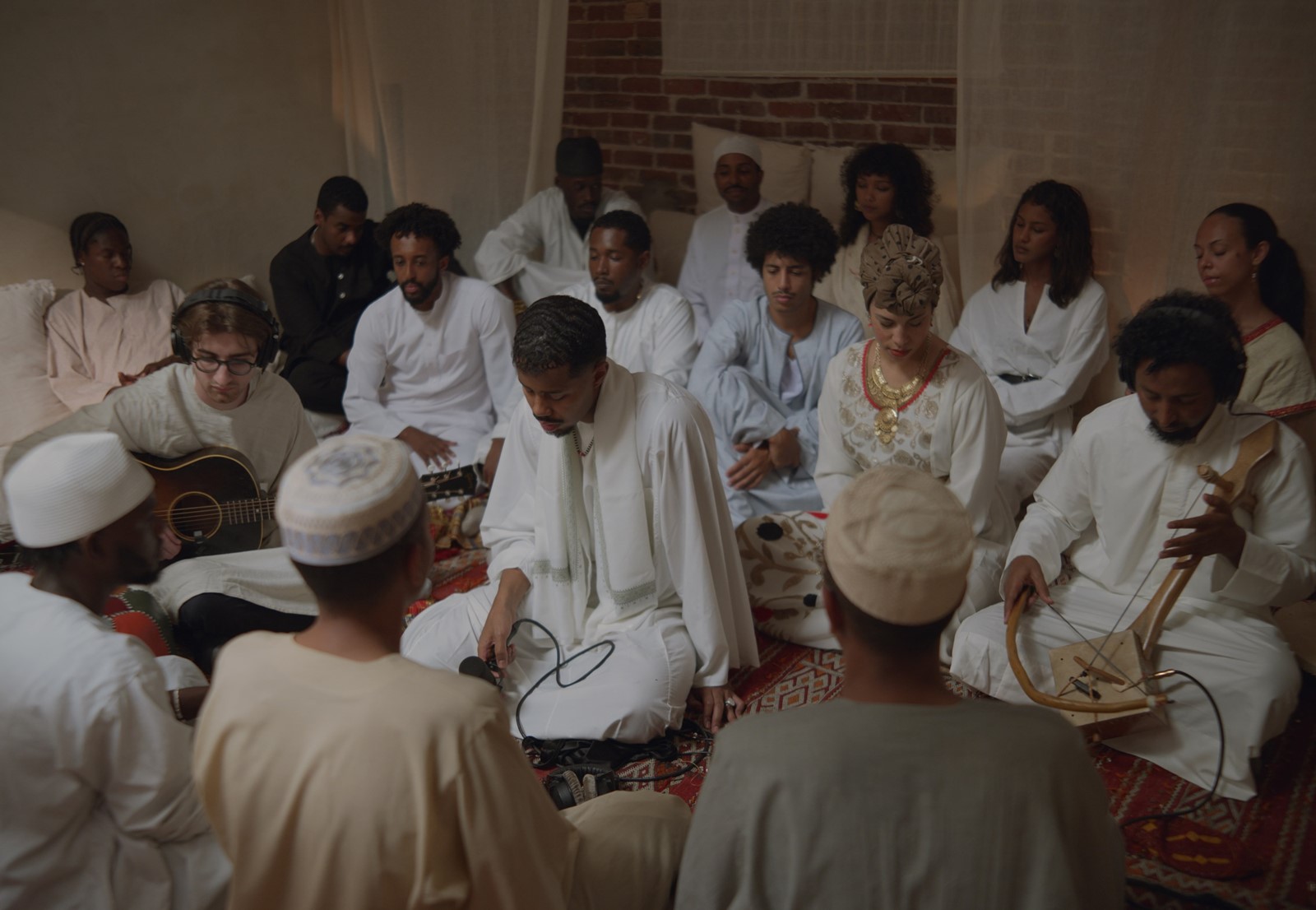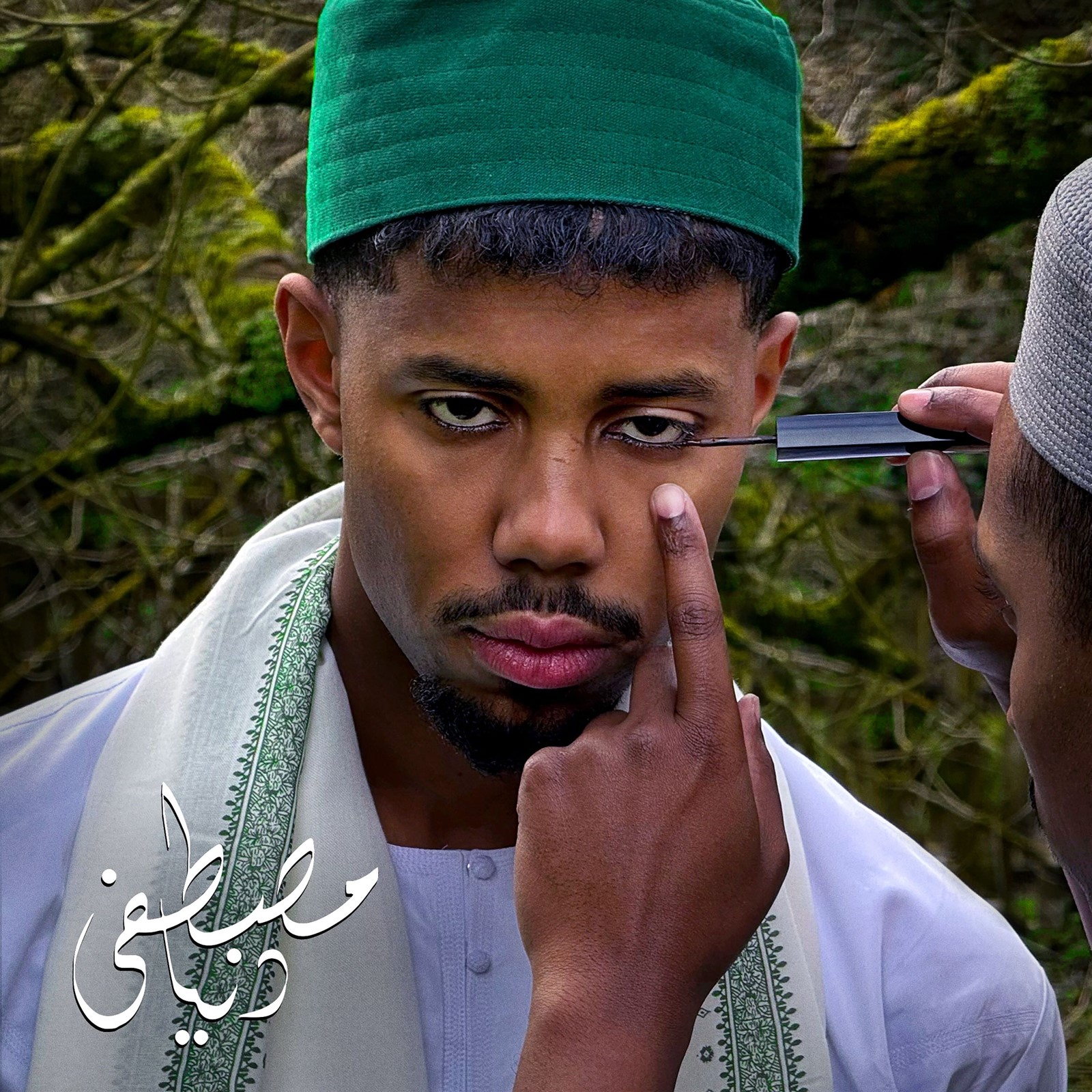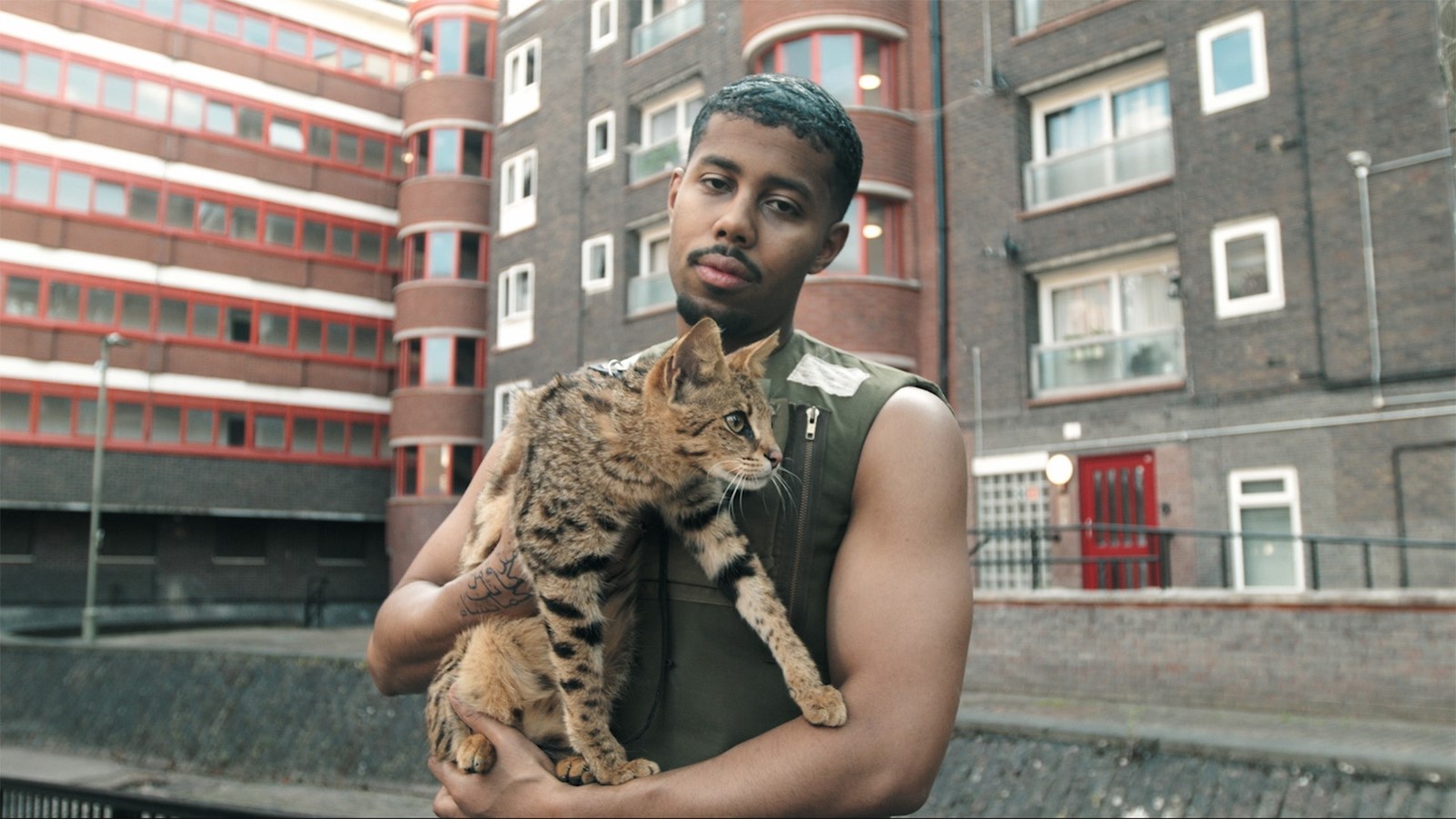To understand the word ’Dunya’ is to know that our realities are tangible yet temporary. That the air escaping our nostrils is not promised for tomorrow but gracefully given to us by God above. “It can mean a lot of things but essentially it means the world derogatorily,” Mustafa the Poet says explaining the title of his 13-track debut album Dunya. At the age of 28, Mustafa conceptualises the present world with a sense of inner clarity adopted through his experiences, opening his eyes to see the world in all its flaws.
The coherence of thought obtained through his Sudanese-Canadian identity, faith and growing up in Toronto is the underlying pillar of his autobiographical poetic storytelling. In 2020, Mustafa paid tribute to his past peers whose lives were cut short by gun violence on his debut song Stay Alive. He then released his first project When Smoke Rises in 2021, which further propelled him to heights people from the 69-acre housing complex of Regent Park, Toronto – AKA Cabbagetown where he is from – don’t always experience. The project was shortlisted for the 2021 Polaris Music Prize and won the 2022 Juno Award for Alternative Album of the Year.
But his run of accomplishments was met with intense sorrow, loss, and pain when his brother Mohamed Ahmed was fatally shot and killed in his car in downtown Toronto in 2023. Still, Mustafa pushed on and curated his latest album as an account of personal breakthroughs and a caring integration of his life thus far. From Gaza Is Calling, which is a sentimental track illustrating the story of a childhood friend from an occupied region, to the oud instrument taking centre stage in I’ll Go Anywhere, each song provides an assertive voice soaked in novelistic affairs while dripping with social-political and religious themes.
In the following 50 questions, Mustafa the Poet shares his journey with Islam, the fight for justice in occupied and oppressed nations, balancing the emotional weight of the subject matters in his music and the growing pains of his journey.

1. What mood are you in today? I’m exhausted.
2. What’s the first thing you did when you woke up this morning? I had to pray so I made wudu.
3. What’s one food you could eat every day and never get tired of? Injera.
4. What’s your go-to activity to unwind after a long day? I read poetry or I call one of my boys back in Toronto so they can ramble on about hood politics.
5. What would you be doing if you weren’t making music? Studying Islam in Medina.
6. What’s your favourite movie growing up? Don’t Be a Menace to South Central While Drinking Your Juice in the Hood or Matilda.
7. If you could instantly learn any new skill, what would it be? Violin.
8. What’s the most memorable piece of artwork you’ve consumed? George Harrison’s original recordings of All Things Must Pass or Nina Simone’s Who Knows Where the Time Goes.
9. If you could have dinner with any historical figure, who would it be? Prophet Muhammad.
10. What album would you listen to for the rest of your life? Sufjan Stevens’ Carrie & Lowell.
“[My art] it never feels political to me; everything is inherently political. I am from the hood everything we do has a political implication to it” – Mustafa the Poet
11. ‘Dunya’ has many meanings but is called ‘the world’. How do you define ‘the world in all its flaws’, and how does this concept weave through your album? My album is about my escape from the world and attempting to hold the world together while it’s falling apart. Dunya is a word I heard often while growing up.
12. How do you explore intimate storytelling and address universal themes? I try to be as brave as possible and tell every story as intimately as I can. That’s all I can do.
13. The song SNL blends elements of folk with modern cultural narratives. How do you see your music’s relationship between tradition and the contemporary? My household looked like an old living room in 1996 in Khartoum, Sudan, and then I stepped out in the hood, and it was a different feeling and then I stepped out the borders of the hood and it was an entirely different world.
14. Your lyrics are like poetry in motion. How do you approach the transition from spoken word to songwriting? It’s that you do not treat it as a transition, and you simply build from the ground.
15. What artists, visual or musical, shaped your perspective growing up? Cat Stevens.
16. Religion plays a pivotal role in Dunya. How has your relationship with Islam informed this project? I am a practising Muslim – I pray five times a day. Even if I wanted to separate it, I couldn’t.
17. What is your biggest takeaway from the Abrahamic religions? This life is so small, and short, and so much of what we do is connected to something beyond this life.
18. You collaborated with artists like Rosalía and Aaron Dessner on this album. Is there any specific reason why you decided to take this route? They create music in their world and I wanted my music to also reflect that.
19. The oud features prominently on I’ll Go Anywhere. How does this instrument connect you to your heritage? I used to hear it growing up when I was in Sudan and Egypt so when I hear it, the instrument transports me to that land.
20. Loss and pain are recurring themes in your work. How has the expression of storytelling about your brother and friends’ passing on the album helped you deal with grief? It doesn’t. You must have a separate grieving process for your healing. The art will not guide you to healing but can only be a mirror.
21. How do you reconcile the personal and political aspects of your art? It never feels political to me – everything is inherently political. I am from the hood, everything we do has a political implication to it.
22. Gaza Is Calling stands out on the album. Can you share more about your connection with the story behind this song? He’s from the hood; he came from Gaza when he was 12 years old, and he was crazy and willing to take it there. It took me a long time to realise why he was like that but as I grew up and found out what was happening to his home Palestine it made sense.
23. “Free Congo, Free Palestine, Free Sudan, Free Haiti” is a popular call for action. How do you see artists as instrumental in fighting for justice for all? Artists have a massive responsibility as we are all benefiting from the structures that are oppressing others. We have a responsibility because it is blood money that we are spending.
24. How do you balance the emotional weight of your subject matter with the need to create art that resonates? Just try to make it as fire as possible. I’m also looking for a feeling for myself in what I create.
25. Faith is a journey. How do you express this evolving relationship through music while being honest about your struggles? Muslims are judgemental but I just try to practise the Deen as much as I can.
26. You’ve been songwriting for significant artists. How did those experiences prepare you for the creation of Dunya? Just practise and sharpen the sword.
27. How does your approach to songwriting differ when writing for yourself versus writing for other artists? When you write for others you’re holding up a mirror for them. When you write for yourself, you’re holding a mirror to yourself.
28. How do you ensure your voice and thoughts remain authentic amid mainstream and indie music circles? Don’t listen to anyone but yourself and the community.
29. The simplicity of your music is seen as disarming in conflict. Do you consciously aim to strip down your sound to its rawest form? Yes, I’m not making music for the club.
30. Old Life on the album contains moments of quietness. What role does silence play in your music and your life? Most of the prayers in Islam are meant to be whispered so at least five times a day I get a moment of silence.
“Artists have a massive responsibility as we are all benefiting from the structures that are oppressing others. We have a responsibility because it is blood money that we are spending” – Mustafa the Poet
31. How do you preserve and celebrate “ordinary life in the hood” through your music? Telling the stories of ordinary people that are living outside of this visibility.
32. How do you see the future of music in one word? Short.
33. Why are novelistic details important for creatives seeking to represent the stories of their immediate environment? Because a lot of us are bored.
34. How do you aim listeners to maintain a sense of hope in your music despite often dealing with heavy themes? I’m still looking for that hope.
35. The song Name of God delves into religious questioning. How do you address questions of faith and doubt for yourself? I just ask the question and leave it to God and that’s the beauty of faith.
36. How do you think your Sudanese-Canadian background helped you grapple with identity growing up? Because we’re one of the quietest communities in the diaspora and because of that I’ve been able to establish my voice.
37. What role do conversations with friends and family play in your creative process? It’s the most important role.
38. How do you think travelling worldwide over the years has crafted the nuanced themes you explore today? It helps conceptualise my thoughts.
39. With its diverse cultural landscape, how has Toronto built you over the years? It’s home, so everything in Toronto has informed me.
40. How do you envision your music visually as you create it? It is a Black hood Muslim fantasy.

41. How has the album been a step of personal breakthroughs for you? It’s a reminder that no tragedy in the world would make the world stop.
42. How do you view your role as a musician in addressing issues like gang violence and childhood trauma? There are elephants in the room and my job is to put a microphone on it.
43. What has been the most surprising feedback you’ve received from young people who connect with your music? Sometimes I am writing for one of my friends in the hood and a young girl who can’t relate to it loves it and that is the beauty of it.
44. What does success look like to you? Success is freedom and our freedom changes yearly.
45. You have taken a long time to drop an album from your last project. Is there any reason why? I’ve always taken my time. I don’t believe in rushing anything.
46. How do you view the idea of incompleteness in art? When the full truth of a song or piece of art is abandoned to want it to serve more people. It’s such a moving target.
47. How does nostalgia influence you in one word? Reminder.
48. How do you find inspiration in everyday life? Going on a group FaceTime call with my friends is enough to find inspiration for me.
49. What growing pains were necessary for your journey through life? Every death.
50. What stories are you most excited to explore in your future work? Romance, I’ve had no time to explore that.
Dunya by Mustafa the Poet is out now.
